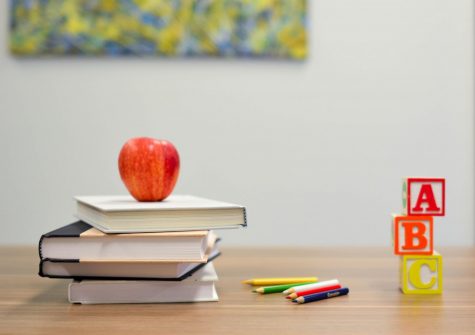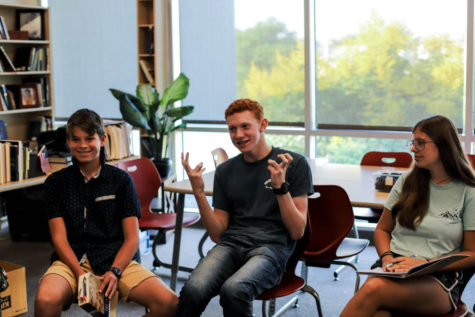From an Irate Senior to CAHS Administration: A Letter Concerning the 2022-2023 Phone Policy
With every new school year come changes for students, teachers, and parents alike. Those changes could be necessary or unnecessary, and sometimes controversial. For the 2022-2023 school year, the CAHS administration put a new phone policy in place — and very few people are happy about it.
This is my fourth year attending CAHS and my 13th at a school run by Classical Academy. In all those years, I have never experienced such a strict blanket ban on students being able to keep their personal property either on them or in their backpacks.
The new policy, for those who are unaware, requires teachers to have students place their phones in sleeves on the wall or somewhere in the classroom. Interestingly enough, I was not able to obtain either a hard copy or a digital copy of this new policy from any of my teachers. The old policy, which is still the policy listed in the Parent/Student 2022-2023 handbook as of 8/30/2022, simply requires phones to be on silent and not used during classes. When comparing the two policies — or, if the exact wording is not currently available to students, comparing how these two policies are enforced — it is clear that this new policy is far more demanding for teachers, and to students, particularly those who attended CAHS prior to the implementation of the new policy, it is unfair and overly strict.
Notably, there is an additional policy in the Parent/Student 2022-2023 handbook surrounding the use of technology in general. It states that “The Classical Academies has integrated technology into the curriculum wherever possible [… and the] digital devices and platforms used at The Classical Academies [include] networks, computers, laptops, Chromebooks, cell phones, iPads, tablets, smartphones, smartwatches, e-readers, and platforms such as Schoology, G Suite for Education. Students learn to apply technology as a tool to access, process, and distribute information.” This policy then goes on to outline that students are expected to only use technology for educational purposes while in classes. If that is the case, then why place a blanket ban on phone use? Many educational programs are available as apps (Quizlet, Duolingo, Schoology, etc.), and booting up a smartphone to type out a rough draft on Google Docs is much quicker than booting up a Chromebook. Wouldn’t allowing students to use their phones for educational purposes boost productivity to some degree? They wouldn’t need to wait in line to grab a Chromebook or wait for their login information to process, a fairly familiar waste of time to many CAHS students.
There are some classes I’ve taken where phones are honestly somewhat necessary. In journalism, we sometimes need to track down a student. If we can’t find the information we need in any of the official school documents at our disposal, we turn to Instagram. But we can’t access Instagram on the school wifi, so we need to use our cellular data, and in turn, our phones. Other times, we need to text classmates who aren’t on campus that day for clarification on something we’re discussing and/or working on in class. For the Crimson staff, we sometimes need to read other publications to help with the background research for an article we’re planning. If the publication is blocked on the school’s wifi, we have to use our phones to read it. In my art classes, listening to music has helped me and other students to get into the mood to work on our art pieces and to drown out background noise — one of my pieces from the 2021-2022 school year was even inspired by the music I was listening to during class! There have even been non-elective courses where my phone was pretty handy to have, but particularly so in Spanish: it’s a lot quicker to pull your phone out to go through Quizlet flashcards than it is to wait in line for a Chromebook.
Even without considering the ways this new policy apparently contradicts the policies spelled out in the Parent/Student Handbook, I think it’s worth pointing out just how many holes can be poked in it once you bring up emergencies.
If a student’s family is going through some sort of emergency, does that student need to make a special request to keep their phone on them to receive any important updates concerning the situation? If so, should a teacher even have the right to deny a student the ability to know what’s going on in a situation that could be involving a family member’s life?
How about fire drills? Students are required to simply line up and leave the classroom without any of their belongings. If a teacher doesn’t hang their phone sleeves by the door, are students expected to just leave the classroom without their phones? In the event of a real fire, that could result in thousands of dollars of damage to personal property — the newest iPhones are $600+ and the latest Samsungs are in a similar price range. Are parents expected to just buy their student a new phone at a moment’s notice because their student wasn’t allowed to keep their phone in their pocket?
What about a lockdown? Seniors who attended CAHS back in 2019 will remember the lockdown we had due to a false report of a man with a gun in the nearby area, and I’m sure most of the staff at CAHS will remember that as well. In a situation like that, or, in a worst-case scenario, one worse than that, will students not be allowed to contact their parents to inform them about what’s going on? In a lockdown, letting students grab their phones from a sleeve on the wall wastes time that could be used for securing the classroom and trying to protect everyone in it. With that sort of situation in mind, doesn’t it make more sense for students to keep their phones on them?
I think that there’s a point to be made about whether or not this policy sets students up for success. If, as the CAHS administration seems to be suggesting, students are too attached to their phones, forcing students to put their phones in pockets at the front of the classroom will most likely have the reverse effect of making students more attached to their phones. When CAHS students go off to college, will they be more likely to explore their newfound phone freedom by scrolling through social media during lectures? After all, how many college professors force their students to put their phones in pockets at the front of the classroom? By letting students learn the importance of paying attention to lectures in high school, they’re being set up for success in college — failing a high school class is much cheaper than failing a college class, after all, and parents would be able to intervene much more effectively with a highschooler than with a college student.
Finally, there’s a point to be made about responsibility. A high school is an interesting place. Around half the students are old enough to drive, some students are already turning 18 and, with that, are becoming legal adults, and undoubtedly, a large percentage of the population at any given high school are considering their futures. High schoolers want to be treated as adults, to some extent. We want to get a taste of the responsibility and privileges we’re going to get to experience post-graduation, and this new policy is, quite frankly, a slap in the face. Not only does it treat all of the students at CAHS like children — even the class that’ll be heading off to college as legal adults in a year or less! — but it makes all of us feel like the staff and administration at Classical Academy High School do not have any trust in us. If that is the reason for this new policy, I’d assume there was an event or two in particular that led to that loss of trust, and with that, I have to say that the probability of the entire school being somehow involved in those events is very slim. Is this policy the result of a lack of trust? If so, what caused you to lose trust in us? How can we regain that trust?
To put all of this as simply as possible, the 2022-2023 phone policy needs to either be reworked or done away with. It hinders the possibilities that come with blending technology with education, it makes little to no sense when any sort of emergency is put into consideration, it sets students up for failure in college, and, most importantly, it shows a lack of trust in the students at CAHS which, in turn, will lead to a lack of trust in the staff and administration. There really isn’t any other way to conclude but to make a request. To the administration at CAHS: reconsider this new policy. I understand that there are reasons for it that I may not see from my perspective, but I would ask that you at least consider the concerns that I have raised. Thank you for your time.
After reading this article, please consider filling out this optional survey on your thoughts concerning the new phone policy.












Hannah Roberts • Aug 31, 2022 at 6:03 pm
Great article! I graduated in 2019 and I remember them putting a similar policy into place. All of your critiques and criticisms are totally valid from the point of view of someone who is currently in college. Also, what happens if a student leaves their phone at home? Will the teacher believe them? Or will they attempt to search the student for the phone? There are so many holes that can be poked in this new policy, especially when it seems that there is nothing in writing that enforces these rules. In my experience, only a handful of teachers actually abided by that policy. I think that it would be much more reasonable to require students to keep phones off their desk, or in their backpack at most. Perhaps a phone holder at the front of class would make sense for test days. Thank you so much for voicing your concerns!
Reanna • Aug 31, 2022 at 4:02 pm
Great points! Really cohesive coverage, and you make a compelling argument! Highly encourage you to share this with administrators.
Danica Jordan • Aug 30, 2022 at 12:26 pm
Very well-written and persuasive article! You’ve laid out some fantastic points that I hope the school takes into consideration. Proud of you, Crimson Staff! Hope this year is full of more great articles like this!